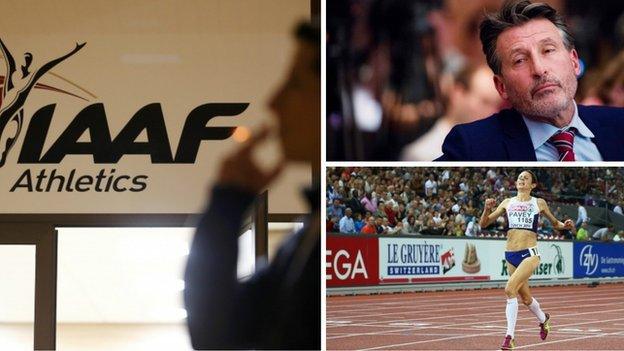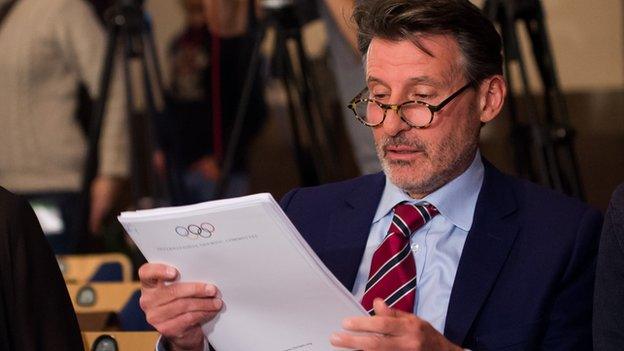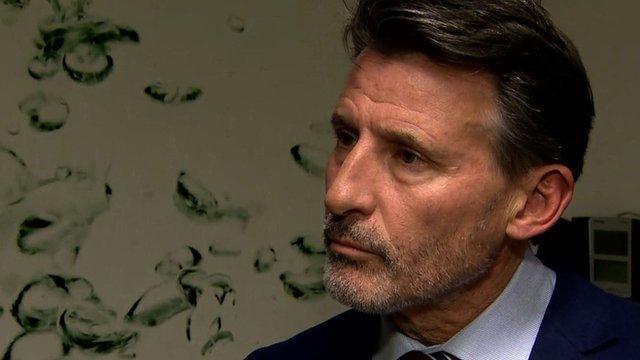Adidas to end IAAF sponsorship deal early in wake of doping crisis
- Published
Wada report: Three things learned from doping scandal
Adidas, the IAAF's biggest sponsor, has told athletics' world governing body it is to terminate its sponsorship deal four years early.
The sportswear giant informed the IAAF of its decision - understood to be a direct result of the doping scandal sweeping the sport - last week.
Sources say the move will cost the IAAF and its commercial partner Dentsu tens of millions of dollars in revenue.
It is sure to come as a major blow for embattled president Lord Coe.
Neither Adidas nor the IAAF - the International Association of Athletics Federations - confirmed the split but both issued short statements.
They both referenced the "reform process" under way as the IAAF attempts to come to terms with a number of damaging revelations.
They also said they were "in close contact" with each other, with the IAAF insisting it was in close contact with "all its sponsors and partners".
Adidas, which designs and manufactures sports shoes, clothing and accessories, has also expressed its displeasure at the corruption scandal that continues to engulf Fifa.
However, the German firm, which signed a £750m kit sponsorship deal with British football giants Manchester United in 2014, remains the oldest commercial partner of world football's governing body.
How much will the IAAF lose?
The 11-year sponsorship deal with Adidas was set to run until 2019 and was reportedly worth $33m (£23m).
However, sources have told the BBC the figure is much higher - as much, in terms of cash and product, as about $8m (£5.6m) per year.
This means the projected lost revenue for the IAAF and its agency Dentsu, external over the next four years alone will be more than $30m (£21m).
In August, the IAAF said its projected revenue for 2015 was $42.8m (£30m). For 2016, it said the sum would jump to $81.9m (£57.4m) with added income from the Olympic Games in Rio de Janeiro.
"In terms of finance it is a setback, but it is not fatal. It is a hit they can take," said BBC athletics correspondent Mike Costello. "But it is about perception. This is a hammer blow."
Adidas is just one of the IAAF's official partners, along with Canon, Toyota, Seiko, TDK, TBS and Mondo.
According to an official press release that accompanied the deal announcement in 2008, the partnership between the IAAF and Adidas incorporated "every aspect of athletics, from product creation, to grassroots development and retail distribution".
Under the agreement, Adidas also became the official sponsor of the 2009 World Championships in Berlin.
Why is Adidas bowing out?
The BBC understands Adidas informed the IAAF in November it was considering ending their relationship early after a report detailed claims of "state sponsored doping" within Russia., external
More on the IAAF scandal |
|---|
The report was compiled by an independent commission set up by the World Anti-Doping Agency (Wada).
Earlier this month, the commission's chairman, Dick Pound, delivered a second, damning report, external that said "corruption was embedded" within the IAAF under former president Lamine Diack.
Within days, a decision at the highest level in Adidas was taken to terminate its deal with the IAAF and Dentsu.
The BBC understands termination letters were sent from Adidas to the IAAF and Dentsu last week.
It is understood the German multinational believes the doping revelations in Pound's reports constitute a breach of its agreement with the IAAF.
Olympic gold medallist Darren Campbell said the news Adidas was ending its sponsorship deal early would have a major impact on the sport.
"It's one thing to say we won't be renewing our contract after 2019 but to actually terminate your contract now, seven, eight months before the start of the Olympic Games, this is huge," said the Briton.
Sports finance expert Rob Wilson said athletics is perhaps not as important as it once was to Adidas.
"As one of the largest kit suppliers in the world, sponsorship is vital to Adidas," he told BBC Sport.
"However, it is fair to say the impact of athletics sponsorship is declining and they are moving toward football as a more important area of growth."
What will the IAAF do?
IAAF is not in denial - Lord Coe
It is not clear if the IAAF will challenge the decision in court, although lawyers at Adidas are understood to be preparing for such a move.
The withdrawal of Adidas will come as a major blow to the sport - and to IAAF president Coe - in a time of unprecedented turmoil.
Coe succeeded Diack in August last year and has come under pressure following the publication of Pound's second report.
Not only did it claim that corruption was "embedded" in the IAAF, it also claimed that leading figures within it must have been aware of it.
Coe, who won Olympic 1500m gold at the 1980 and 1984 Games, served as one of four IAAF vice-presidents under Diack for seven years.
Despite the spotlight on Coe, Pound says he "couldn't think of anyone better" than the Englishman, 59, to lead athletics out of its crisis.
The Wada reports on state-sponsored doping have left athletics facing an Olympic year with major reputational damage to repair.
It is also facing a French criminal investigation into corruption, which is looking into the awarding of every World Championships since 2007, including London's successful bid, external to host the event in 2017.
It now seems Adidas believes there is too much reputational risk to its brand to continue its association with the IAAF.
"I think this comes down to how Adidas are changing their sponsorship approach," added Wilson.
"They are spending millions on the Manchester United deal that is stretching their budgets. To me, this seems more like a repositioning exercise."
- Published14 January 2016

- Published14 January 2016

- Published14 January 2016
